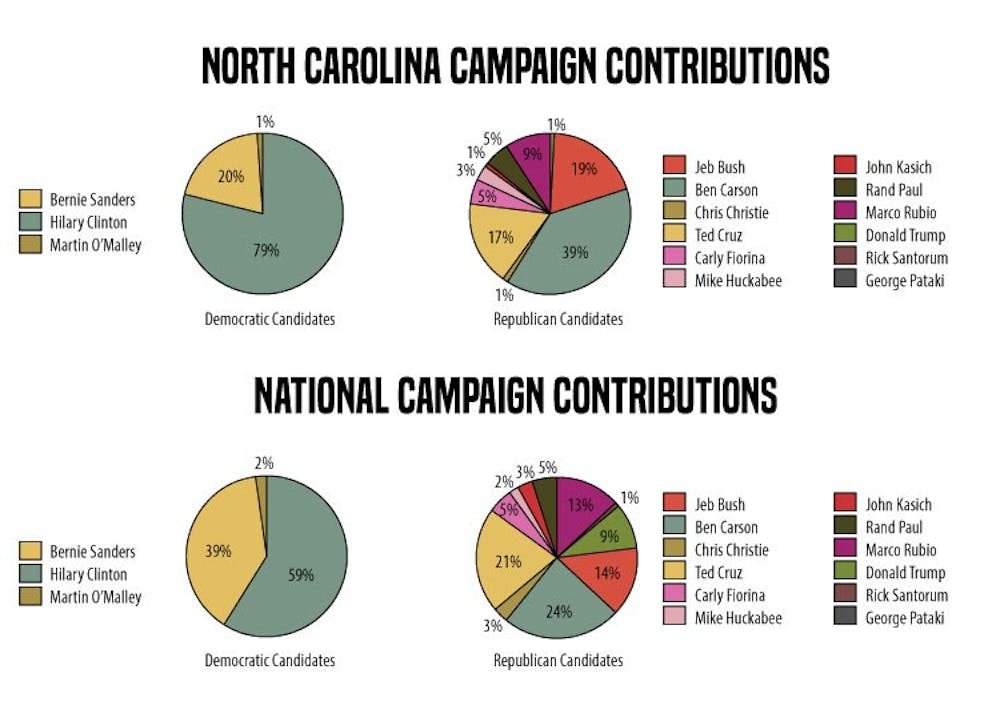Former Secretary of State Hillary Clinton and retired neurosurgeon Ben Carson are receiving widespread support from North Carolina residents, according to year-end presidential candidate reports released Monday by the Federal Election Commission (FEC).
In each election cycle, candidates are required to provide reports to the FEC highlighting their campaign spending and campaign contributions received. With 2016 underway and votes already cast in the Iowa caucuses, the year-end reports come at a particularly revealing time.
Of the 12 presidential candidates — 10 Republicans and two Democrats — Clinton leads the pack with $1.2 million in individual contributions received from the Tar Heel State during 2015.
Carson is Clinton’s closest competitor, with more than $930,000. The gap widens for the remaining 10 candidates, with next-biggest contribution earner former Gov. Jeb Bush (R-Fla.) bringing in about $450,000.
Republican front-runner Donald Trump ranks 11th in North Carolina campaign contributions with less than $30,000.
But the most revealing statistic from the year-end report might be the huge gap between Clinton and Sen. Bernie Sanders (I-Vt.) in North Carolina. Sanders earned about $300,000 — nearly four times less than Clinton.
The race for first in total contributions across all states within the Democratic Party is much tighter.
Clinton earned the most from individual donors with $112 million, while Sanders ranked second with $74.3 million. Former Maryland Gov. Martin O’Malley (R-Md.), now no longer a contender for the nomination, was well behind with just $4.7 million.
The field of 10 Republicans features five main leaders in national contributions.
Carson ranks first with $53.7 million. Sen. Ted Cruz (R-Texas) is slightly behind Carson with $46.9 million. Bush lags behind with $31.8 million, and is trailed by Sen. Marco Rubio (R-Fla.) with $27.7 million and Trump with $19.3 million.
While the figures mentioned above highlight totals for campaign contributions, it is important to understand the source of the contributions.
For example, Bush received more than $200,000 from political committees during 2015 while Clinton earned about $900,000. Sanders, on the other hand, received less than $4,000 in contributions from political committees.
In addition to political committees, several business executives offer money to presidential candidates.
John Belk of Belk, Inc. contributed the maximum $2,700 to Clinton’s campaign. Lilicia Bailey, executive vice president of Belk, Inc., also made $2,700 in contributions to Clinton.
The majority of Clinton’s contributions came from wealthier donors. About 60 percent of Clinton’s $112 million came from contributions of at least $2,000. Similarly, 79 percent of Bush’s contributions totaled at least $2,000.
Bush has received funds from 22,863 individuals and 85 Political Action Committees (PACs) while Clinton has received contributions from 163,251 individuals and 425 PACs.
Other candidates have relied more on smaller contributions. Eighty-five percent of Sanders’ total receipts have totaled no more than $200.
According to FEC Public Affairs Specialist Julia Queen, Sanders received 222,347 individual contributions and three PAC contributions.
But not all candidates are looking for funding from the general public.
During a Jan. 28 rally at Drake University in Des Moines, Iowa, Donald Trump bragged about funding his own campaign and turning down $1 million from some of his friends, including businessman Phil Ruffin.
“Being No. 1, [wealthy donors] all want to control you,” Trump said during the rally.
He added that several of his competitors, especially Bush, would be influenced by their contributors if elected president.
Candidates still in the race by the end of March will file a quarterly report to the FEC April 15.


